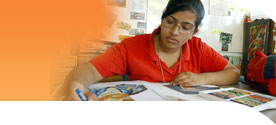



The art and design programme of study provides a context for developing pupils' personal, learning and thinking skills (PLTS).
Pupils learn how to purposefully observe, investigate, contemplate and explore ideas through a range of forms. They are able to research strategically, exploring, recording and presenting their observations through visual and other forms to a range of audiences. A sketchbook or journal may provide evidence of such activity or communicate the story, developments or revisions.
Pupils learn to try out new ideas and processes without fear of failure and become confident and purposeful risk takers. They analyse and evaluate what they experience and observe, judging the relevance and value according to intentions. Through the development of ideas and images they learn to explore issues, events and problems from different perspectives and viewpoints.
Pupils are encouraged to become creative thinkers, creators and communicators, generating ideas and other outcomes purposefully. They adapt ideas iteratively, making use of feedback from peers, teachers and others, and use creative approaches to solving problems. Pupils have opportunities to use new technologies to investigate options and versions of work, exploring a broad range of ideas and ways of working. Art, craft and design allows pupils to find creative ways to produce images and artefacts that communicate their thoughts and feelings to a range of audiences.
Pupils have opportunities to collaborate in groups, working towards common goals and taking on the responsibility for different roles, from generating initial ideas to production. They develop the sensitivity and skills that are necessary for negotiating, evaluating and sharing in the collaborative process of creating and making images and artefacts. They adapt behaviours to suit different roles and situations.
As they progress through the key stage, pupils will have opportunities to work with increasing independence, initiating projects and taking and managing risks. They will organise time and resources over long-term and short-term projects, prioritising actions and needs.
The programme of study provides opportunities for pupils to actively engage with issues that affect them and those around them. This helps them understand how their creative practice can impact and make a contribution to their school or wider community. As a result, pupils show increasing confidence in themselves and the contribution they can make to their own and others' lives. They will develop the knowledge, skills and understanding to enable them to share and communicate with their peers and across cultures.
Pupils learn to reflect critically, assessing their own performance and that of others for both process and product, using existing or establishing value-based frameworks. They identify opportunities for further development, set goals and recognise achievements. They develop the skills to communicate their learning in relevant ways to for different audiences, using visual and non-visual forms.
With thoughtful planning, a range of PLTS can be embedded in any sequence of work. For example, pupils might be asked to develop work around the theme of world events over a series of lessons. This would involve pupils: